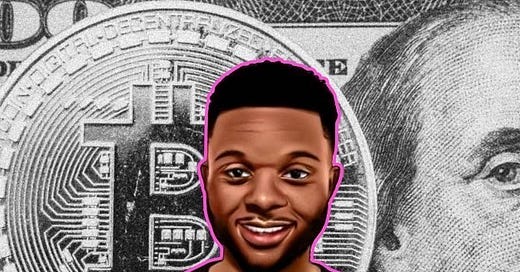Truth be told. The best way to learn about Bitcoin is to BUY IT and experiment with it. Last week I paved the way for you to become a Satoshi MILLIONAIRE and discussed Bitcoin as a store of value. This week, we'll discuss the last pieces of the Bitcoin Jigsaw puzzle. As I've eluded, Bitcoin's protocol (Bitcoin network) is open and decentralized. Well, guess what? So is the internet. Some describe Bitcoin as the "Internet of Money"- a decentralized transaction network (Blockchain) and technological breakthrough in the finance system.
Did you hear Bitcoin approached all-time highs on Saturday, reaching as high as USD 60,000? Not bad for a cryptocurrency that traded for $0.0008 in 2010, right?
One thing's for sure, Bitcoin is a REVOLUTION, and it's transforming finance as we know it. Crypto provides privacy and anonymity for its users. But as with all revolutions, there is resistance and systems that want to preserve power, surveillance and control. So how can a crypto investor protect against that? Well, keep reading, I'll tell you how.
Okay, so if you didn't already know, the REAL secret behind Bitcoin is 'Blockchain Technology.' Bitcoin's Blockchain (the oldest Blockchain in existence) is an 'open-source type database' (ledger) that stores financial transaction history- 'record-keeping technology' at its finest. The Blockchain is a decentralized distributed ledger and does not store any of its value in a single location as a centralized entity would. Every ten minutes, the blockchain network takes all the bitcoin transactions and puts them into a block. These 'Blocks' of transactions or digital data are chained together to the previous block and spread across an entire network of nodes (computers). Giving you the Bitcoin Block-Chain
Bitcoin's Blockchain is immutable and transparent, publicly available so everyone can see exactly how it was added to the network at the same time. Since each transaction is verified through blockchain technology, there is no dependency on third parties. So, from January 3rd, 2009, to right now, you can go back on the Blockchain and see every transaction that ever happened on this network. It's definitely more layered than this, so I encourage those interested to DYOR (do your own research). But you know we like to keep it simplified on The Zo Code. So just remember this, blocks of transactions chained to the previous blocks - give you the Bitcoin Block-Chain. Just as the internet connects us socially, Bitcoin's Blockchain connects us economically. This is revolutionary!
Governments cannot shut down the Bitcoin network because it is the strongest computing network in the world. However, they can issue bans, legislation, and regulations on crypto in their respective countries (see Nigeria). Government rhetoric regarding Bitcoin and other crypto is that digital currencies facilitate illegal activity. But don't be fooled. The amount of fiat money laundered every year is larger than the entire network of Bitcoin. There are 2 trillion dollars of fiat money laundered every year, and the market cap of Bitcoin is only 1 trillion.
To hinder this crypto asset, the government proposed to create their own version called Central Bank Digital Currency (CBDC). Their' trojan horse' strategy will give central banks and governments the perfect excuse to tax their citizens, not to mention the privacy and surveillance risks. If governments are successful, CBDC's could potentially extend the central bank's monopoly into everyone's pockets. When that happens, the government can dig into any citizen's digital wallets and take whatever they want, whenever they want. The solution? Accumulate as much Bitcoin as you can before it's too late!!
The most popular place to purchase crypto is on a digital asset exchange (DAX) or digital currency exchange (DCE) - a digital version of a stock exchange. Why? Because they allow you to buy currencies with your debit or credit card. There are several different exchanges one can choose from - head over to my website to find the best one for you. I think Coinbase is the most user-friendly exchange, so here's a step-by-step guide to buying bitcoin using Coinbase. So where does one keep their Bitcoin anyways? In a cryptocurrency wallet, of course. 'Hot wallets' are digital wallets, while 'cold wallets' are physical devices.
For the most part, hot wallets are free. When you create an account on a DGX, you are creating a hot wallet. Choose one, register, and use it! Hot wallets have been around since the inception of bitcoin. They are attractive and most popular because it's easier to trade or spend crypto, but that shouldn't matter to a HODLER. In my opinion, the best way to protect your digital currency and keep your spending habits private is using a "cold wallet" or cold storage - digital wallets that are not connected to the internet. Though most digital exchanges are pretty secure (some more than others DYOR), an exchange is more vulnerable to online attacks if it is connected to the internet. Take a look at my choice for the best cold storage wallet - and the safest too!
I'll leave you with this. Why don't we give a lot of thought to the little pieces of plastic we carry around in our wallets? Because adoption grew whether you moved with the times or not. View your debit or credit card as the inception of digital cash and Bitcoin as its FUTURE. By 2030 everyone will hold digital assets, whether you like it or not.
Hopefully, by now, you have a better understanding and background on Bitcoin. Going forward, we'll start talking about different crypto projects that I find attractive.
I am looking forward to seeing everyone next week with some 'sats' in their crypto wallet!
And by the way, you can always leave me DM on Instagram if there's anything else you want me to touch on.
Until then
Have a great week and Stay Curious
Zo
If you enjoyed the newsletter today, please forward The Zo Code to someone that may find this insightful.














Share this post